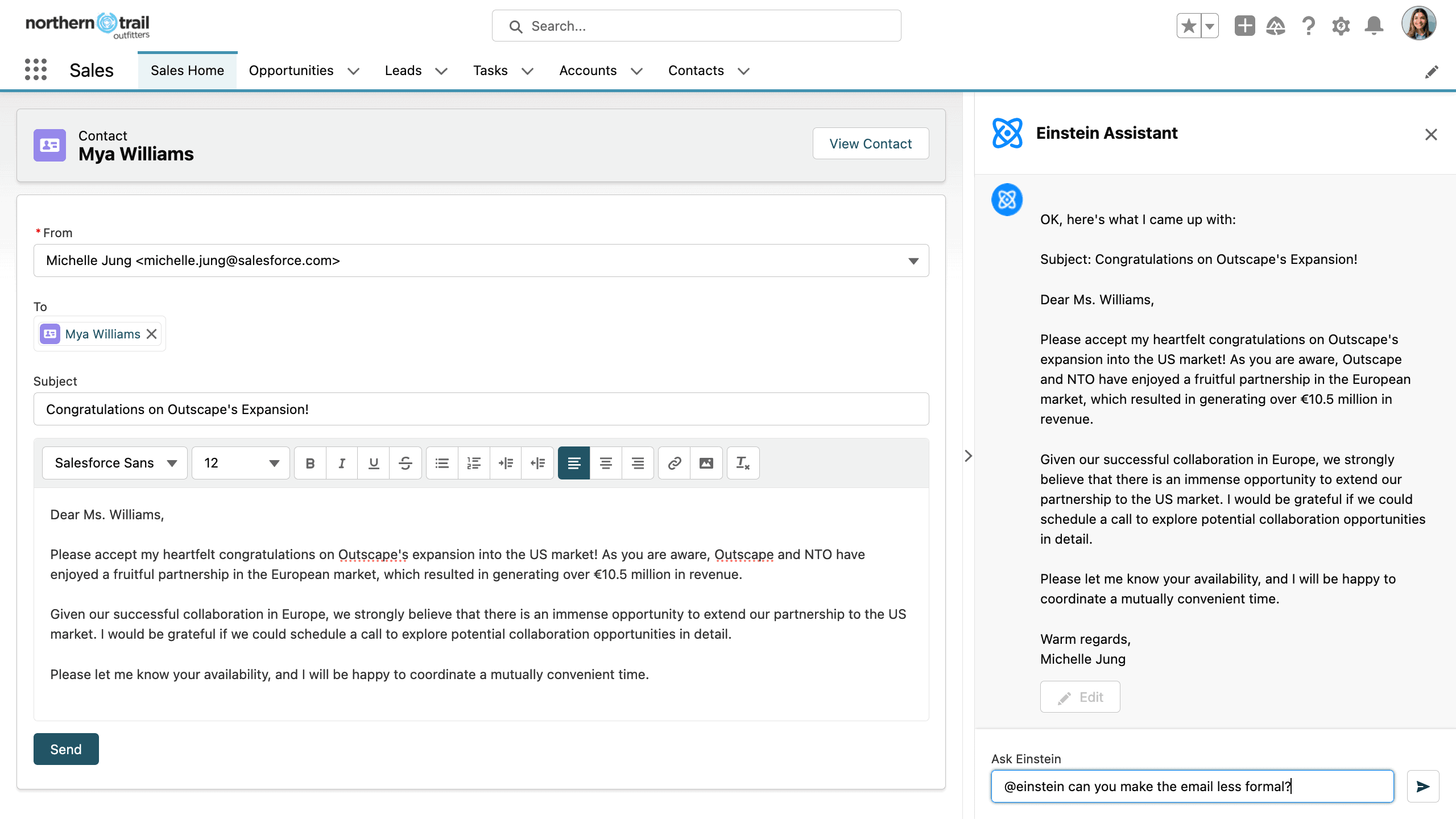The introduction of ChatGPT has not escaped Salesforce’s notice either. Salesforce has also struck a deal with OpenAI to combine the technology with its own AI models. It has named the resulting combination Einstein GPT. It offers employees who work with Salesforce as the organization’s customers a much better experience.
Salesforce has been rapidly embracing OpenAI and getting Einstein GPT off the ground. Its functionality is a big step forward and undoubtedly gives the CRM vendor an edge over other CRM players. Einstein GPT was developed specifically for CRM and the other Salesforce solutions, but is also enriched with real-time information. In addition, Salesforce shows very well what you can achieve when you combine, in this case, Einstein GPT with your corporate data.
Also read: Salesforce Genie makes a real-time personalized customer experience possible
Every employee has his own personal work assistant
If any jobs are lost due to the introduction of AI, it is those of people supporting other people’s work. Salesforce research shows that 57% of IT decision makers see this form of generative AI as a “game changer.” Combining the already existing Einstein AI models with Einstein GPT makes it even easier for employees to do their jobs. Through generative AI, customers are served faster and better, fewer errors are made, and organizations make much more use data within the organization.
The entire research phase and the generation of content, whether it is an email or building a web form, is taken out of your hands. The quality goes up, and the creation process only takes a fraction of the time. You have to do very little yourself as an employee, except perform checks. We get why decision-makers see this as a “game-changer.”
Many benefits, but also some question marks and challenges
Salesforce’s research also reveals that organizations can work more efficiently, and see reduced workload, resulting in fewer people having burnouts. Sales are much more streamlined, and customers are served faster. This technology seems to only have benefits, although the survey still touts some concerns. A third of IT decision-makers worry that generative AI is to hyped, which may make people less careful about security risks and biases.
Surely the biggest risk raised by IT decision makers, 71 percent, is security risks related to their data. The AI uses the data present in your CRM solution to generate better texts, e-mails and maybe even proposals. As an organization, you don’t want specific agreements or discounts with customer A to also end up with customer B. This may not be as big a problem for an online store that sells shoes, but if you’re a wholesaler or offering mortgages, the consequences could be much bigger. To what extent Salesforce can address those kinds of concerns remains to be explored.
Other challenges raised by IT decision-makers are usual problems. For example, 60 percent of IT decision-makers think their current technology stack makes integrating this form of AI impossible. The same goes for their data strategy; 59 percent state they do not have a unified data strategy, making it difficult to combine it with AI.
What does Einstein GPT offer at launch?
Einstein GPT is already in several products. The Sales, Service and Marketing Cloud, and Salesforce developers can also get started with Einstein GPT. Slack which has been part of Salesforce for about 2 years is also getting its own Einstein GPT integration.
Einstein GPT for Sales
With Einstein GPT for Sales (video), salespeople within your organization can create automated emails. They can ask Einstein to draft an email and include certain topics or products in it. Depending on the relationship with the customer, such an email can be written formally or informally.
The speed at which Einstein GPT does this is many times faster than if the salesperson were to write it themselves. Another advantage within larger sales teams is that often not everyone’s language skills are very good. With Einstein GPT the emails will flow better and be of a higher language quality. Even with AI, spelling and grammar errors are not completely gone, but the average quality is very high.

Einstein GPT for Service
One of the departments that may benefit most from Einstein GPT is customer service. Einstein could already use the existing AI to find the best knowledge base articles based on the questions of a customer. Now Salesforce is going one step further, based on the customer’s question an answer is immediately proposed in drafts that can be sent with the push of a button.
Of course, employees can still add their own information that Einstein GPT might have missed. If so, after closing the conversation, the employee can press a button to use the conversation as a new knowledge base article. So that Einstein GPT can answer adequately in the future.
Einstein GPT for Marketing
In this implementation, Salesforce goes a step further than just generating text. Within Salesforce Marketing Cloud people often work on landing pages, creating forms and funnels. You can now have these created directly by Einstein GPT. What kind of image do you want to use on the landing page? Do you need examples for titles? Is there any text that needs to be written to get people to fill in the form? What fields do you want to show on the form? You can just tell Einstein GPT, and the landing page, images, and of course the text will all be generated for you. This is so much faster than doing everything by hand.
Einstein GPT for Developers
As a developer, you can write code to extend Salesforce solutions. With Einstein GPT for Developers you get Einstein within the code editor. You can simply specify what kind of function you want to build and Einstein GPT will generate the code for you. It is then just a matter of making some adjustments to get it perfect. For developers who have not yet fully mastered the documentation and programming language, Einstein GPT is of great value. They don’t have to dig through all the documentation because Einstein writes the code on demand. For experienced developers, it is mainly a matter of saving time.
Einstein GPT for Slack and ChatGPT for Slack
For Slack not one, but two AI solutions will be introduced. Einstein GPT for Slack allows users to get customer insights, brief summaries or potential sales opportunities. You can do research on a customer when you are in a conversation with them.
At the same time, OpenAI is coming out with a ChatGPT for Slack application. It allows you to summarize conversations (threads). Do research on certain topics and ask for help writing messages.
It’s just the beginning of generative AI
We’ve only been talking about ChatGPT for a few months, and its introduction more or less came out of the blue. When you see what Salesforce has already accomplished in those few months. That is impressive. Still, it’s worth emphasizing that this is just the beginning. Of course, Salesforce will continue to develop, but competitors will also start looking at how they can offer similar functionality. They will also examine how they can do even better, forcing the entire industry to improve. The biggest question that remains at this time is availability. Salesforce is not yet putting a date on when this will be available to customers. So we don’t expect it soon, we think it will be launched around Dreamforce in September of 2023.
In addition, Salesforce Ventures, Salesforce’s investment arm, has set up a $250 million fund to invest in potential startups that can take generative AI to an even higher level. Salesforce is also not the only one making investments on this front. Many large tech companies are now investing in generative AI, leading us to believe that this is just the beginning.
Also read: Do you build your Digital HQ with Slack, Zoom, Teams or Webex?
